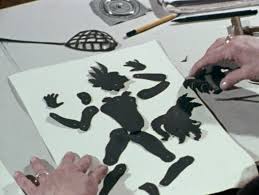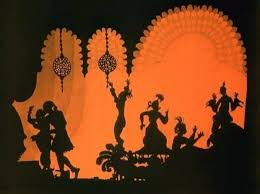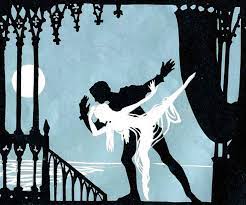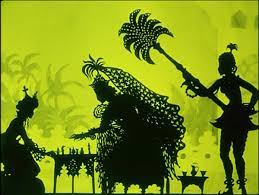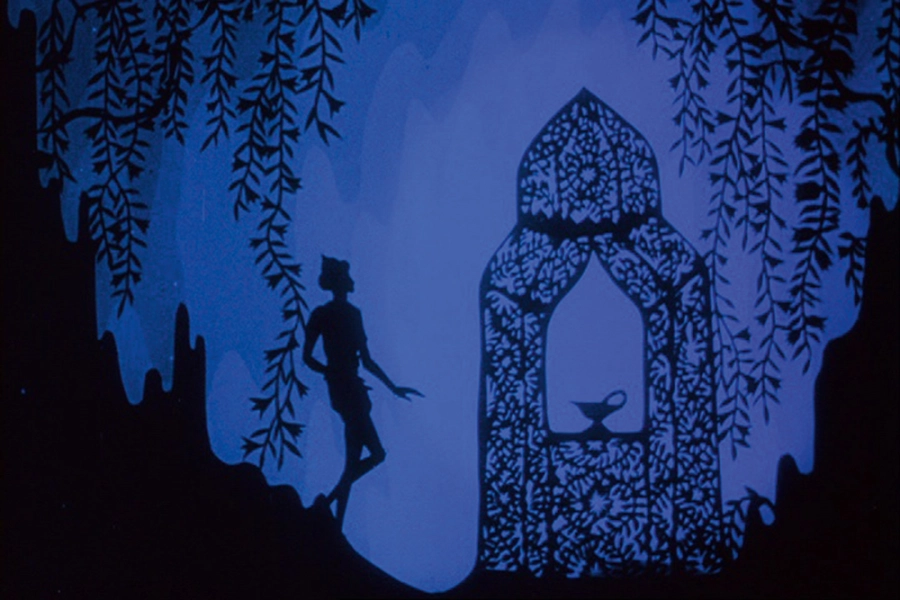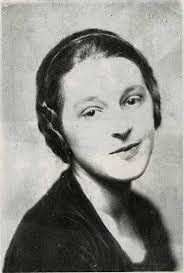Lotte Reiniger: a pioneer of paper-cut animation
- Rachel Goodchild

- Jan 1, 2013
- 4 min read
Updated: Oct 16, 2024
The lady who first inspired me to use paper as a medium was Lottie Reiniger. I have always loved her work. She was making animated features before Walt Disney. Her Paper cut-ots were used to make film, using paper as a silhouette animation. Her attention to detail was outstanding. Lotte Reiniger had an astonishing facility with cutting - holding the scissors still in her right hand, and manipulating the paper at lightning speed with her left hand so that the cut always went in the right direction.
As a child, she was fascinated with the Chinese art of silhouette puppetry, even building her own puppet theater so that she could put on shows for her family and friends. As a teenager, Reiniger fell in love with cinema, first with the films of Georges Méliès for their special effects. In 1915, the young woman attended a lecture by Wegener that focused on the fantastic possibilities of animation. After a bit of persuasion, she convinced her parents to enroll her in the acting group Wegener belonged to, the Theater of Max Reinhardt. In an attempt to attract the attention of her distant and very-busy hero, she started making silhouette portraits of the various actors around her. This had its desired effect, and soon she was making elaborate title cards for Wegener's films, many of which featured silhouettes.

Her style was born out of her love of paper animation and theatre. In the 1920's she soon developed her own style, that stood out from anyone else. She would shape and animated her characters through her paper cut-out method that she had developed. Considering that her paper animations were forced to rely on gestures and action due to the nature of the medium Reiniger was still able to convey emotion that not even facial expressions or sound film could imitate. Lotte's were able to express a fluidity which is very important to her style of expressionism. Although there are other animators in that time period that used these techniques, Reiniger stands out because she is able to accomplish this style using cutout animation.
Once she had cut all her paper cut-outs, she would assemble them onto a multilane camera, which is a motion picture camera that was used in traditional animation. It works by moving a number of pieces of artwork past the camera at various speeds and at various distances from one another, therefor creating depth. By leaving various parts of the artwork layers transparent it allows the other layers to be seen behind. Movements are then photographed frame by frame, so the end result creates an illusion of depth by having many layers of artwork moving at different speeds. The further away the camera, the slower the speed.
Her work is truly outstanding and her Filmography list is immense (see below) where she made films over a period of 60 years. Sadly though, being a women in that time, her work got overshadowed by the likes of Disney, who took all credit for early animation.
Lotte Reiniger's Filmography
1919 – The Ornament of the Lovestruck Heart
1920 – Amor and the Steady Loving Couple
1921 – The Star of Bethlehem
1922 – Sleeping Beauty
1922 – The Flying Suitcase
1922 – The Secret of the Marquise
1922 – Cinderella
1926 – The Adventures of Prince Achmed (feature)
1927 – The Chinese Nightingale
1928 – Dr. Dolittle and His Animals ("The Journey to Africa", "The Monkey Bridge", "The Monkey Illness")
1930 – Chasing Fortune
1930 – Ten Minutes of Mozart
1931 – Harlekin
1932 – Sissi
1933 – Carmen
1934 – The Stolen Heart
1935 – The Seemingly Dead Chinese
1935 – The Little Chimney Sweep
1935 – Galathea: The Living Marblestatue
1935 – Die Jagd nach dem Glück (Hunt for Luck)
1935 – Kalif Storch
1935 – Papageno
1936 – Silhouettes (animation scenes)
1936 – Puss in Boots
1937 – The Tocher. Film Ballet
1938 – The HPO – Heavenly Post Office
1942 – Girl of the Golden West (feature)
1944 – The Goose That Lays the Golden Eggs
1951 – Mary's Birthday
1953 – The Magic Horse
1954 – Aladdin and the Magic Lamp
1954 – Caliph Storch
1954 – Cinderella
1954 – Puss in Boots
1954 – Snow White and Rose Red
1954 – The Frog Prince
1954 – The Gallant Little Tailor
1954 – The Grasshopper and the Ant
1954 – The Little Chimney Sweep
1954 – The Sleeping Beauty
1954 – The Three Wishes
1954 – Thumbelina
1955 – Hansel and Gretel
1955 – Jack and the Beanstalk
1961 – The Frog Prince
1974 - The Lost Son
1975 – Aucassin and Nicolette
1979 – The Rose and the Ring
1980 – Die vier Jahreszeiten (The Four Seasons)
Lotte Reiniger
2 June 1899 - 19 June 1981
Her first film was in 1919 (she would have been 20 years old), and her last was made in 1980 (when she was 81 years old)
Recommendation:
DVD:
There is a lovely DVD (3 hours & 17 mins) that you can purchase that consists of 19 of Lotte's films along with a short documentary about Lotte. Purchase from Amazon here
BOOK:
'Lotte Reiniger Pioneer of Film Animation' by Whitney Grace.
Published by McFarland; Illustrated edition 2017
Purchase from Amazon here
Rachel Goodchild | Design Blog
Creating Pattern for Textile, Product, Home & Packaging
.png)




